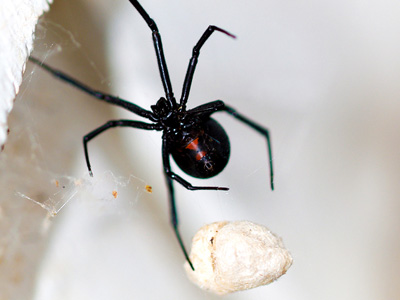The black widow is the most feared and well-known of the 30,000 kinds of spiders that roam the world. This spider is medium in size and has a body length of only half an inch. These spiders only become active during the night and prefer hiding in crevices and dark spaces. Although black widows generally stay away from humans, they can be found in garages and outhouses. A black widow spider bite can be very painful and may even lead to death.

Symptoms of Black Widow Spider Bite
The bite of a black widow spider feels just like a small pinprick in the beginning. Unless you see it happening, you won’t even know that the spider has bitten you. However, sometimes the victim starts feeling the pain immediately after being bitten. Swelling and reddening of the area in and around the bite might occur soon after.
You are going to experience more serious symptoms after a little time has passed. This time period can range from as little as 15 minutes to a few hours. The most common symptom you will feel is pain which will be experienced all over the body. The pain will be greater in the abdomen and the chest as the muscles there will become rigid and start to cramp up. You might experience some pain in your shoulders and back too. More symptoms of black widow spider biteare explained below according to the stages you are at.

Stages of Black Widow Spider Bite
All black widow bites progress through the following stages. The onset of these stages takes less than an hour.
- Local Reaction
As the toxin starts to invade the nerves, the immune system responds and tries to fight it off. At this stage, you will feel itching, redness, swelling and prickling pain at the bite location.
- Anaphylaxis
At this stage, the signs of allergic reactions are shown by the victim. Anaphylaxis is a protective mechanism of the body which exhibits symptoms like fatigue, shortness of breath and hives.
- Systemic Reaction
At this stage, the toxin starts spreading throughout the body and begins affecting the organs. The following symptoms are experienced at this stage: elevated heart rate and blood pressure, chills, perspiration, restlessness, joint pain, abdominal pain and vomiting.
Is Black Widow Spider Bite Fatal?
The poison contained in black widow spider bite can cause seizures and might even lead to death in some cases. However, a healthy adult usually doesn’t die of a black widow bite. People with weak immune systems, elderly people and youngsters can develop serious complication after being bitten by a black widow spider.
When to See a Doctor
Consult your doctor if:
- The pain increases or you experience a change in your pain.
- You have a headache or a fever.
- The wound starts exuding fluid or starts to swell up.
- You are having light sensitivity.
- You encounter difficulty in moving the part that is bitten.
- You feel lumps beginning to form in your armpits or groin.
- The symptoms begin to intensify and spread to the rest of the body.
Call 911 if:
- Abdominal pain intensifies.
- Wound gives off foul odor or turns black or blue.
- Muscle spasms starts happening.
- Walking, talking or breathing becomes difficult.
- Heart rate increases rapidly.
- Chest pain starts spreading to your back, neck and shoulders.
Treatments for Black Widow Spider Bite
The severity of the bite, the symptoms and the health condition of the victim are considered when determining the best treatment for a black widow spider bite. Medications can be given for alleviating the pain and also for lowering the blood pressure that might spike after a black widow bite. Muscle relaxants and even antivenin might be required if the bite is of a serious nature. Hospitalization might be necessary in some cases.
1. First Aid Measures
- Use water and soap to wash the bite location.
- Wrap an ice pack in a cloth and apply it over the bite site.
- Apply antibiotic cream or lotion on the bite location to prevent the chances of infection.
- Prevent swelling by elevating the bitten limb.
- If you can, put the spider, dead or alive, into a small jar to be examined by an expert.
- You might require treatment from a medical facility.
2. Narcotic Pain Relief
Over-the-counter pain medicines don’t work at all for people who suffer a severe bite from a black widow spider. Doctors in the emergency department of hospitals usually use narcotic pain medications to numb the severe pain. Some people may also be given muscle relaxants via injections to provide pain relief.
3. Antivenin
The antivenin used to treat a black widow spider bite is obtained from horse serum. It is often recommended to use one vial of the antivenin in case of any severe bite from a black widow spider. While the antivenin alleviates most of the symptoms quickly, there are side-effects like allergic reaction and serum sickness. This is why the testing of skin is considered necessary before the antivenin is administered.
Prevention of Black Widow Spider Bite
- Try to limit the amount of trash in your home or workplace and remove it on a consistent basis.
- Don’t let any tall grass or weed grow near the foundation of your house.
- When working outside, always wear covered shoes and gloves.
- Keep shoes and gloves in sealed containers and always check garage items for spiders before bringing them inside the house.
